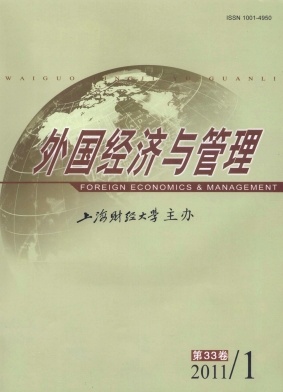人力资源管理理论研究新进展评析与未来展望
外国经济与管理 2011 年 第 33 卷第 01 期, 页码:1 - 10
摘要
参考文献
摘要
近年来,在多元全球化、全球经济危机和低碳化经济的影响下,企业的经营环境呈现高度的动态性、复杂性与不确定性特征,这就要求人力资源管理理论对变化了的环境做出相应的反应。本文围绕胜任素质、员工敬业度、工作—家庭冲突、雇佣关系和跨文化管理这五个当前人力资源管理理论研究的新热点,对近几年的人力资源管理研究进行了梳理,并在此基础上结合环境变化,对未来人力资源管理研究的发展方向进行了展望,以期对我国人力资源管理理论研究的发展有所裨益。
①参见:赵曙明,人力资源管理理论研究现状分析[J].外国经济与管理,2005,27(1):15-20。
[1]McClelland,D C.Testing for competence rather than for intelligence[J].American Psychologist,1973,28(1):1-15.
[2]Sandberg,J,and Pinnington,A H.Professional competence as ways of being:An existential ontological perspective[J].Journal ofManagement Studies,2009,46(7):1 138-1 170.
[3]Kahn,W.Psychological conditions of personal engagement and disengagement at work[J].Academy of Management Journal,1990,33(4):692-724.
[4]Maslach,C,Schaufeli,WB,and Leiter,MP.Job burnout[J].Annual Reviewof Psychology,2001,52(3):397-422.
[5]Edwards,Jeffrey R,and Nancy P Rothbard.Mechanisms linking work and family:Clarifying the relationship between work andfamily constructs[J].Academy of Management Review,2000,25(1):178-199.
[6]Clark,S C.Work/family border theory:Anewtheory of work/family balance[J].Human Relations,2000,53(6):747-770.
[7]Greenhaus,J H,and Powell,G N.When work andfamily are allies:Atheory of work-family enrichment[J].Academy of Manage-ment Review,2006,31(1):72-92.
[8]Carlson,D S,and Perrewe,P L.The role of social support in the stressor-strain relationship:An examination of work-family con-flict[J].Journal of Management,1999,25(4):513-540.
[9]Tsui,A S,Pearce,J L,Porter,L W,and Hite,J P.Choice of employee organization relationship:Influence of external andinternalorganizational factors[A].in G R Ferris(Ed.).Research in personnel and human resource management[C].Greenwich,CT:JAI Press,1995,13:117-151.
[10]Tsui,A S,Pearce,J L,Porter,L W,and Tripoli,A M.Alternative approaches to the employment organization relationship:Doesinvest ment in employees pay off?[J].Academy of Management Journal,1997,40(5):1 089-1 121.
[11]Shore,L M,Tetrick,L E,Lynch,P,and Barksdale,K.Social and economic exchange:Construct development and validation[J].Journal of Applied Social Psychology,2006,36(4):837-867.
[12]Redding,S G.The thick description and comparison of societal systems of capitalism[J].Journal of International Business Stud-ies,2005,36(2):123-155.
[13]Maznevski,M,and Chudoba,K.Bridging space over ti me:Global virtual team dynamics and effectiveness[J].Organization Sci-ence,2000,11(5):473-492.
[14]Chevrier,S.Cross-cultural management in multinational project groups[J].Journal of World Business,2003,38(3):141-149.
[15]Boyacigiller,N A,and Adler,NJ.The parochial dinosaur:Organizational sciencein a global context[J].Academy of ManagementReview,1991,16(2):262-290.
[16]Hofstede,G.Culture’s consequences:Comparing values,behaviors,institutions,and organizations across nations[M].(2nded.).Thousand Oaks,CA:Sage,2001.
[17]Gerhart,B,and Fang,M.National culture and human resource management:Assumptions and evidence[J].International Journalof Human Resource Management,2005,16(6):975-990.
[18]Johns,G.The essential i mpact of context on organizational behavior[J].Academy of Management Review,2006,31(2):386-408.
[19]赵曙明.我国管理者职业化胜任素质研究[M].北京:北京大学出版社,2008.
[20]Park,S H,and Luo,Y.Guanxi and organizational dynamics:Organizational networking in Chinese firms[J].Strategic Manage-ment Journal,2001,22(5):455-477.
[1]McClelland,D C.Testing for competence rather than for intelligence[J].American Psychologist,1973,28(1):1-15.
[2]Sandberg,J,and Pinnington,A H.Professional competence as ways of being:An existential ontological perspective[J].Journal ofManagement Studies,2009,46(7):1 138-1 170.
[3]Kahn,W.Psychological conditions of personal engagement and disengagement at work[J].Academy of Management Journal,1990,33(4):692-724.
[4]Maslach,C,Schaufeli,WB,and Leiter,MP.Job burnout[J].Annual Reviewof Psychology,2001,52(3):397-422.
[5]Edwards,Jeffrey R,and Nancy P Rothbard.Mechanisms linking work and family:Clarifying the relationship between work andfamily constructs[J].Academy of Management Review,2000,25(1):178-199.
[6]Clark,S C.Work/family border theory:Anewtheory of work/family balance[J].Human Relations,2000,53(6):747-770.
[7]Greenhaus,J H,and Powell,G N.When work andfamily are allies:Atheory of work-family enrichment[J].Academy of Manage-ment Review,2006,31(1):72-92.
[8]Carlson,D S,and Perrewe,P L.The role of social support in the stressor-strain relationship:An examination of work-family con-flict[J].Journal of Management,1999,25(4):513-540.
[9]Tsui,A S,Pearce,J L,Porter,L W,and Hite,J P.Choice of employee organization relationship:Influence of external andinternalorganizational factors[A].in G R Ferris(Ed.).Research in personnel and human resource management[C].Greenwich,CT:JAI Press,1995,13:117-151.
[10]Tsui,A S,Pearce,J L,Porter,L W,and Tripoli,A M.Alternative approaches to the employment organization relationship:Doesinvest ment in employees pay off?[J].Academy of Management Journal,1997,40(5):1 089-1 121.
[11]Shore,L M,Tetrick,L E,Lynch,P,and Barksdale,K.Social and economic exchange:Construct development and validation[J].Journal of Applied Social Psychology,2006,36(4):837-867.
[12]Redding,S G.The thick description and comparison of societal systems of capitalism[J].Journal of International Business Stud-ies,2005,36(2):123-155.
[13]Maznevski,M,and Chudoba,K.Bridging space over ti me:Global virtual team dynamics and effectiveness[J].Organization Sci-ence,2000,11(5):473-492.
[14]Chevrier,S.Cross-cultural management in multinational project groups[J].Journal of World Business,2003,38(3):141-149.
[15]Boyacigiller,N A,and Adler,NJ.The parochial dinosaur:Organizational sciencein a global context[J].Academy of ManagementReview,1991,16(2):262-290.
[16]Hofstede,G.Culture’s consequences:Comparing values,behaviors,institutions,and organizations across nations[M].(2nded.).Thousand Oaks,CA:Sage,2001.
[17]Gerhart,B,and Fang,M.National culture and human resource management:Assumptions and evidence[J].International Journalof Human Resource Management,2005,16(6):975-990.
[18]Johns,G.The essential i mpact of context on organizational behavior[J].Academy of Management Review,2006,31(2):386-408.
[19]赵曙明.我国管理者职业化胜任素质研究[M].北京:北京大学出版社,2008.
[20]Park,S H,and Luo,Y.Guanxi and organizational dynamics:Organizational networking in Chinese firms[J].Strategic Manage-ment Journal,2001,22(5):455-477.
引用本文
赵曙明. 人力资源管理理论研究新进展评析与未来展望[J]. 外国经济与管理, 2011, 33(1): 1–10.
导出参考文献,格式为:
下一篇:CPSED概述及其学术价值探讨





 9106
9106  251
251

